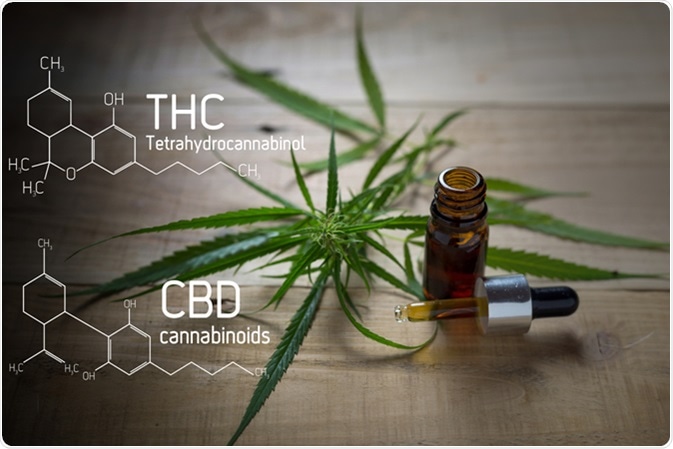Cannabidiol (CBD) was initially discovered as a medication to treat Dravet syndrome, but is now used extensively to treat several medical and lifestyle disorders in addition to being used as recreational drug.
One of the popular modes in which is available is CBD oil. There are several producers and distributers of oil made from tetrahydrocannabinol (THC) and its isomer CBD; however, there remains much uncertainty regarding the quality, safety, and legal status of these oils.

Image Credit: Infinity Time / Shutterstock
What is CBD and THC oil?
CBD oil is made by dissolving a concentrated solvent extract from cannabis flowers or leaves in another edible oil, such as sunflower oil, hemp oil, or olive oil. Different solvents that are used range from organic solvents like ethanol, isopropyl alcohol to petroleum-ether, and naptha.
The solvents used affect taste, colour, and viscosity of the resultant CBD oil. The solvent may be additionally subjected to “winterisation,” a process where the extract is kept in a freezer at -20°C to -80°C.
Due to such a low temperature, the compounds that have a higher melting point, including waxes, triglyceraldehydes, and chlorophyll will precipitate and can be removed by filtration or centrifugation. This process is employed to remove other components that are sometimes co-extracted along with desired cannabinoids.
Apart from purifying the oil, this process can also improve the taste and colour of the product.
THC oil is usually known as “Simpson oil.”
What are the possible contaminants in CBD and THC oils?
Terpenes
The presence of terpenes in CBD or THC oil depends on the kind of preparation method that is used. As terpenes are very volatile, they could be removed by elevated temperatures during the drying of plant material or while evaporation of the solvents. It is also possible to re-introduce the evaporated terpenes by the process of condensation into the final oil.
Pesticides or synthetic cannabinoids
Contaminants, such as pesticides and synthetic cannabinoids, may be deliberately added to the CBD oil to increase yield, weight, or potency. A study found that pesticides are very frequently present in the cannabis oil that is sold in Dutch coffee shops, legal cannabis that is sold under the state law in California, and also in medicinal cannabis sold by licenced producers in Canada. Pesticides, if present in hemp, are very likely to be present in a concentrated form in the final oil product.
Unintentional toxins
During the various stages of manufacture, storage, and distribution, unhygienic practices may lead to unwanted and unintentional contaminants, such as heavy metals, molds, bacteria, aflatoxins that may be very detrimental to health.
Toxic solvents
In many cases, the solvents used during the manufacturing process are harmful or toxic. Naptha and petroleum ether have boiling points ranging from 30°C to 200°C. These solvents are harmful and flammable, and some solvents, such as hexane and benzene are, considered neurotoxic. According to Material Safety Data Sheets (MSDS) provided by manufacturers, naptha and petroleum ether are also potential carcinogens.
Also, products sold as Naptha may contain additional impurities to increase its stability, but also its hazardous potential. GC and NMR has revealed contamination of naptha with petroleum hydrocarbons. As petroleum hydrocarbons have higher boiling points, they are also resistant to evaporation procedures and may require additional methods to remove them. For this purpose, non-toxic solvents such as olive oil may be used. Olive oil is economical, not flammable, non-toxic, and only needs to be heated to the boiling point of water.
What are the difficulties in detecting contaminants in CBD or THC oil?
Many professional labs now offer expertise in detecting contaminants in food crops, medicinal plants, or edible oils. These methods may be modified for CBD or THC oil evaluation. However, there is a current lack of consensus on which analytical method to be used to perform cannabinoid analysis. Also, there are no guidelines or certifications to examine cannabis labs.
Further Reading
Last Updated: Mar 8, 2023